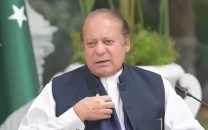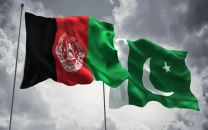Brown man’s debt, white man’s burden
Pakistan can still be a place like anywhere else, where heroes bring us together than split us apart.

The writer is a lawyer based in Lahore and studied law at Lincoln’s Inn and the London School of Economics. He tweets @AsadRahim
So, when he sat down to write “The White Man’s Burden”, he did so as an imperialist with rare self-awareness. Kipling put into words what was left unsaid: the duty of the white man to civilise the wretches he saw around him, to rule their lands in pursuit of this noble mission, and to treat it as a burden by grace of being the better race. Empire died before most of us were born, but it’s a phrase that still tugs at our heritage: the conceit of the concept, the shame of submitting to it, the feelings of inadequacy the coloniser fed on. To hear ‘white man’s burden’ today is to feel anger well-justified.
Assed Baig’s piece on “Malala Yousufzai and the white saviour complex” (white man’s burden 2.0) plays into this. To skin the elephant in the room first, we are seeing all kinds of people disturbed by the Malala phenomenon. And however hard it is for the English press to hear, it’s a segment that is growing. They include the usual suspects: Facebook warriors, the JUI-F, creepy Dajjal theorists, the JUI-F again. But they also include rational, thoughtful, angry Pakistanis. And their concerns (the considered ones) are best engaged than tweeted ironically. We’ve learnt the hard way that changing perspectives requires debate, not dismissal.
One takes Mr Baig’s critique over others because it’s relatively considered (and competition was scarce). He argued “the Western saviour complex had hijacked Malala’s message,” that it “allowed countries like Britain to hide their sins in Afghanistan and Iraq”, that she was rescued from the barbarians by ‘white knights’, and that journalists could focus on the girls Nato saved by bombing, over the girls the US actually bombed via drone strike. Less worthily, he said Malala was the ‘good native’ who’d neither mention drones nor policy.
There can be agreement with Mr Baig on some counts: drone attacks are acts of evil, a child’s right to education cannot be allowed to edge out their right to life, and Malala’s rescue served as a PR victory for parties less deserving. To witness Gordon Brown stretching his lips (the man is incapable of physically smiling) standing by Malala in the UN, having deprived Iraqi girls in the thousands of their schools, lives and families, smells of rank hypocrisy. Sweeping logic maybe, yet one that resonates in all of us.
But that’s where it ends. Mr Baig’s term ‘white saviour complex’ gained currency when Nigerian-American writer Teju Cole used it last year, for a sketchy NGO called Invisible Children. Invisible Children had been pushing the First World to ‘stop’ an African warlord, to Mr Cole’s ire. But Mr Cole also did something we’re terrified of doing: point his powers of perception at himself. “I involve myself in this critique of privilege … my cell phone was likely manufactured by poorly treated workers in a Chinese factory, the coltan in the phone can probably be traced to the conflict-riven Congo. I don’t fool myself that I am not implicated in these transnational networks of oppressive practices.”
In our case, where the evil of white man’s burden ends, the evil of brown man’s debasement begins. It was a brown man that shot Malala Yousufzai, knowing the state would do nothing. It was our own brown men that let him escape to Afghanistan. It was those brown neighbours that sneered they weren’t interested in pursuing cross-border criminals. Our compassion for fellow browns let local healthcare sink to the state it’s in, allowing Mr Baig’s ‘white knights’ to ride in and save her life with better facilities.
It was also our own brown men, who condemned a little girl for doing what they went weak in the knees over. While they were busy compromising, a child was standing up, and getting shot in the face for it. It was educated, emasculated brown men again that resorted to conspiracy theories in response. And it falls on this little girl to scream about drones in the UN, while our brown marshals keep those pretty F-16s grounded and our brown statesmen cower in palaces? Today’s use of beghairat may be a slur that covers drone apologists, but the traditional meaning is meant to shame much harder. A man with no heart and no guts. Both apply to the citizens who latch on to one without fighting as hard for the other.
Uganda’s Idi Amin understood imperialism as well as Kipling, if from the wrong end of the Crown. A hulk from the King’s African Rifles, Idi was thought “a splendid chap to have about” by one British superior. As President For Life, his way of dealing with white man’s burden was literal: forcing Britons to carry him on their shoulders. His reign led to some 300,000 deaths. Evil knows no race — it’s time we understood as much. The life of a girl threatened by brown savages is every bit as sacred as one threatened by white drones.
Pakistanis, preoccupied with white man’s burden, should try brown man’s guilt instead: with security that prevents their children from getting shot at by maniacs, education that inspires and empowers them and healthcare that saves their lives so that others won’t have to. If nothing else, Malala is a hero all of us can believe in. And Pakistan can still be a place like anywhere else, where heroes bring us together than split us apart.
Published in The Express Tribune, July 23rd, 2013.
Like Opinion & Editorial on Facebook, follow @ETOpEd on Twitter to receive all updates on all our daily pieces.











1726134115-0/BeFunk_-(41)1726134115-0-208x130.webp)




COMMENTS
Comments are moderated and generally will be posted if they are on-topic and not abusive.
For more information, please see our Comments FAQ